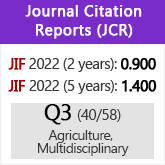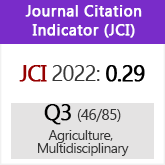Short communication. First report of black queen-cell virus detection in honey bees (Apis mellifera) in Spain
Abstract
The black queen-cell virus (BQCV) is a RNA virus recently classified within the Family Dicistroviridae, genus Cripavirus. Although BQCV is found worldwide, it has never been previously reported in Spain in spite of the fact that this country is the main producer of honey bees (Apis mellifera) in the European Union. This study presents a clinical and laboratory description of a BQCV outbreak in honey bees within an apiary made up of 80 colonies in the province of Toledo (Spain). Mortality was associated with signs of diarrhoea, enlarged abdomen, oedema in the midgut, and distended rectum filled with a transparent liquid. The parasite Nosema apis has been reported in BQCV outbreaks. The acute clinical picture, with symptoms of diarrhoea and massive deaths of adult bees, could be related to the association between N. apis and the BQCV since, under normal circumstances, cases of nosemosis caused by N. apis reported in Spain over the last 10 years were always anecdotal and in chronic form, with no associated clinical symptoms whatsoever detected in the beehives. On the other hand, in cases of nosemosis linked to N. ceranae, the clinical symptoms are entirely different, with no evidence at all of diarrhoea and massive deaths around the beehive but only a progressive decrease in the population. The sample of adult bees was analysed by the polymerase chain reaction method for BQCV and a fragment of 700 bp sequenced (Acc. No. DQ132875). It was also noted that this sample had a high spore count of N. apis epidemiologically related to BQCV. The possible role of BQCV in the mortality and associated signs is discussed in this work.Downloads
© CSIC. Manuscripts published in both the printed and online versions of this Journal are the property of Consejo Superior de Investigaciones Científicas, and quoting this source is a requirement for any partial or full reproduction.
All contents of this electronic edition, except where otherwise noted, are distributed under a “Creative Commons Attribution 4.0 International” (CC BY 4.0) License. You may read here the basic information and the legal text of the license. The indication of the CC BY 4.0 License must be expressly stated in this way when necessary.
Self-archiving in repositories, personal webpages or similar, of any version other than the published by the Editor, is not allowed.















